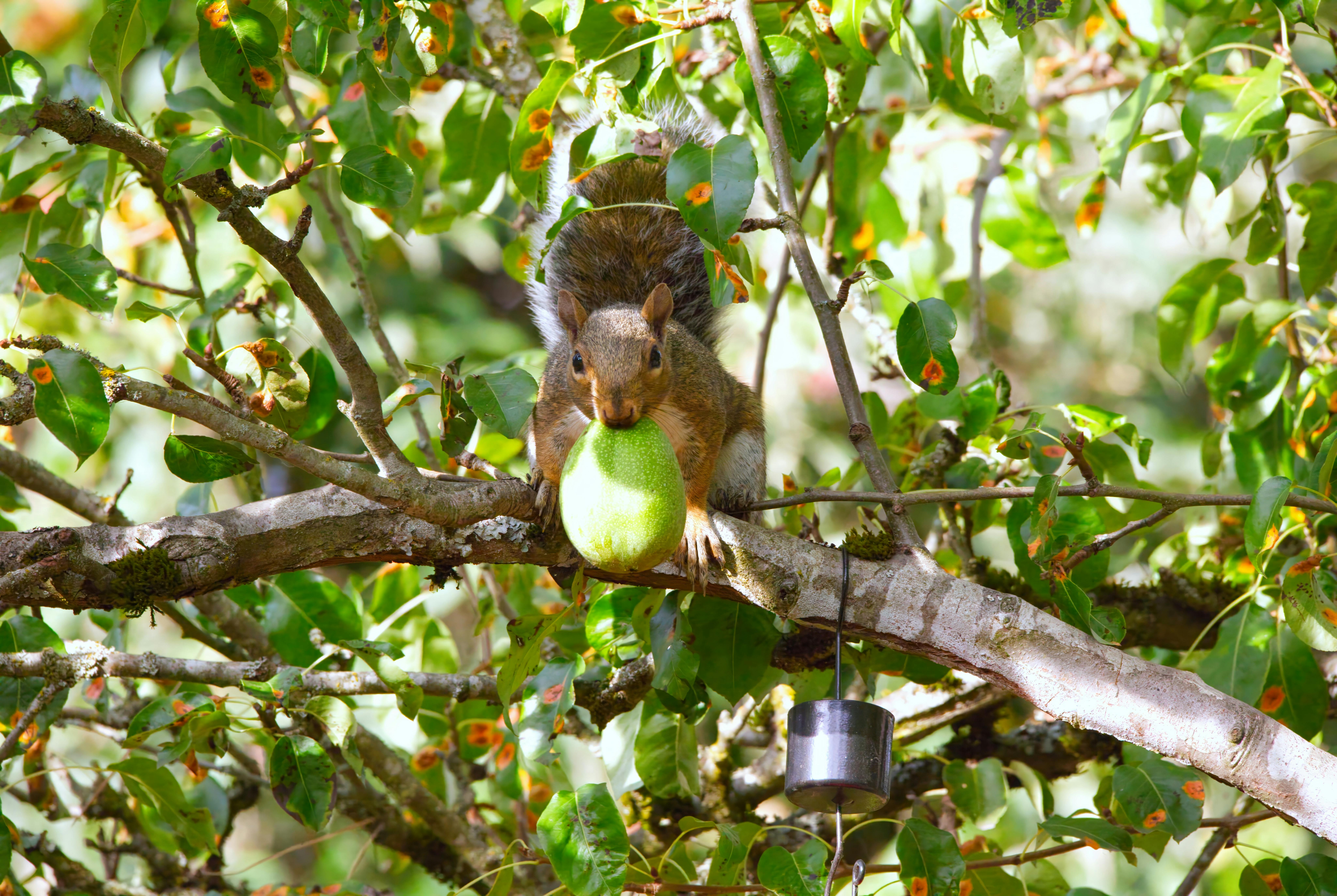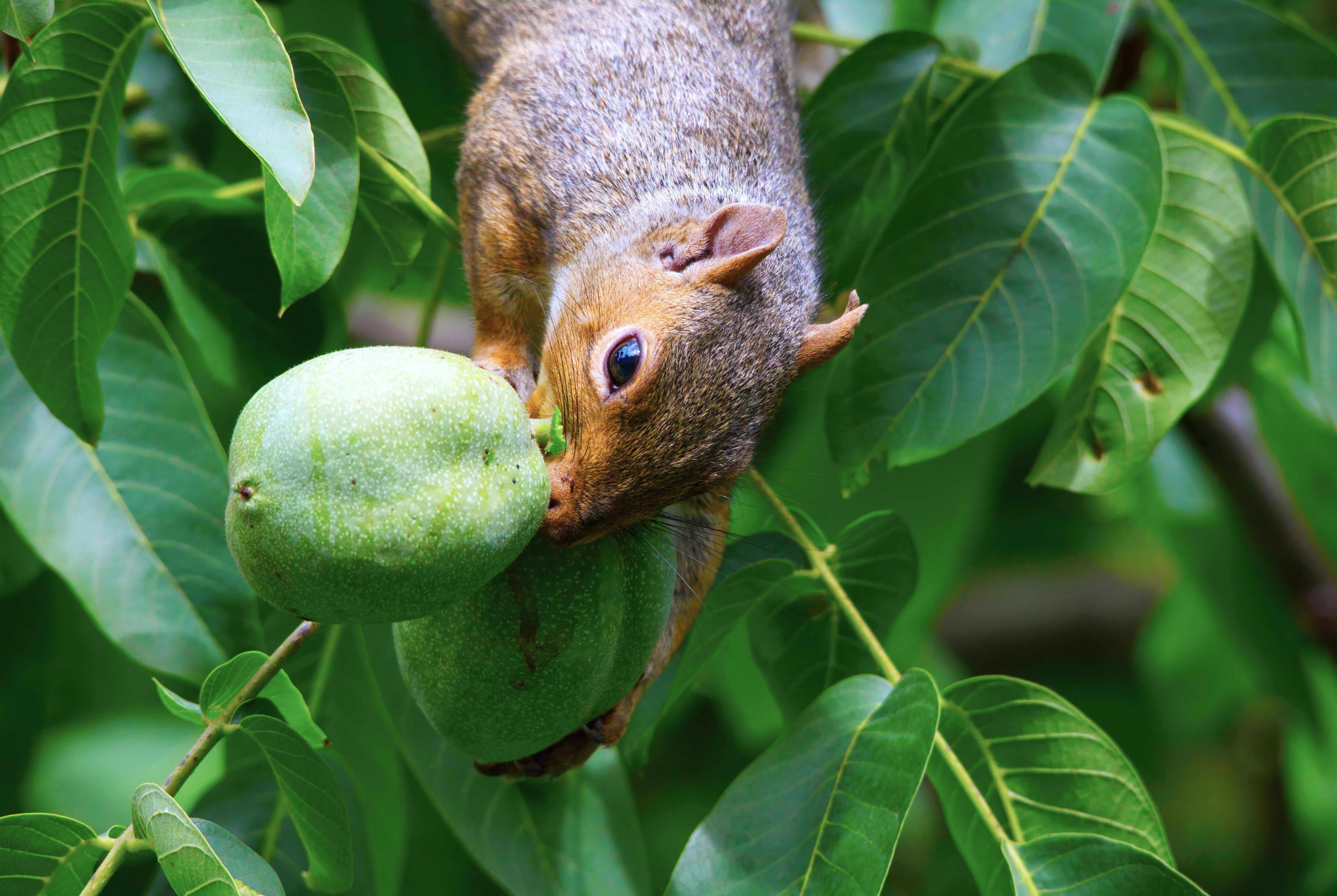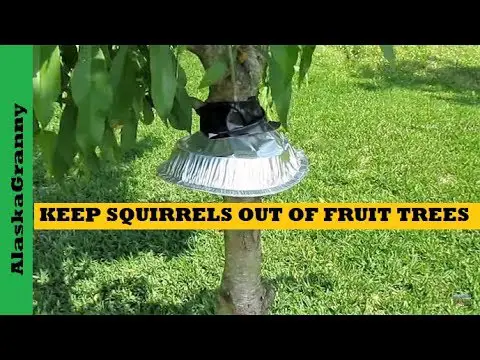Squirrels can be pesky pests in your garden, particularly when it comes to fruit trees. They love to eat the fruit from the trees, and they can quickly become a nuisance. Fortunately, there are several ways to get rid of squirrels from your fruit trees and keep them away for good. In this article, we’ll discuss how to safely and effectively remove squirrels from your fruit trees and keep them away.Squirrels are attracted to fruit trees for several reasons. The most obvious is the abundance of food provided by the ripening fruit. Additionally, the branches of a fruit tree provide a safe and comfortable place for squirrels to rest and nest. The presence of other animals or humans in the area can also draw squirrels to a fruit tree, as they are curious by nature and enjoy exploring new environments. Finally, older fruit trees often have hollowed out areas that squirrels can use as dens or nesting sites.
How To Deter Squirrels From Fruit Trees
Squirrels can be a real nuisance to fruit trees. They can eat the fruit before it has a chance to ripen, or they can damage the tree itself by gnawing on the bark or branches. Fortunately, there are some easy ways to deter squirrels from your fruit trees.
The first step is to make sure that all food sources near your fruit tree are removed. Squirrels love to feed on nuts, birdseed, and other types of food, so it’s important to make sure that these sources are not available for them to access. Additionally, any garbage cans or compost piles should be kept away from the fruit tree as these can provide potential food sources for squirrels.
Next, you should consider installing some sort of physical barrier around the base of the tree. This could be something as simple as chicken wire or mesh fencing that is buried a few inches into the ground so that squirrels cannot burrow underneath it. This will help to keep them away from the tree and also prevent them from getting too close to any fruits that may be ripening on the branches.
Another effective method is to use motion-activated sprinklers or ultrasonic devices around your tree. These devices will detect when a squirrel is in the vicinity and emit either a strong spray of water or an ultrasonic sound which will startle them and cause them to flee from the area. This is an ideal solution for those who don’t want to have physical barriers around their trees but still want an effective deterrent against squirrels.
Finally, you might also consider using some type of taste deterrent on your fruit tree such as hot sauce or pepper spray which will make it unappealing for squirrels to eat. This method may not work all of the time but it’s worth giving it a try if you’re having trouble keeping squirrels away from your trees.
In summary, there are several ways that you can deter squirrels from your fruit trees such as removing potential food sources, installing physical barriers around the base of the tree, using motion-activated sprinklers and ultrasonic devices, and applying taste deterrents on fruits and branches. With a little bit of effort and patience, you should soon find yourself with healthy and bountiful fruit trees free from pesky critters!
Types Of Repellents That Can Keep Squirrels Away
There are several types of repellents that can be used to keep squirrels away from your property. These repellents include mechanical, chemical, and natural methods. Mechanical methods involve the use of physical barriers such as fences and netting that can be used to keep squirrels away from your yard or garden. Chemical repellents come in the form of sprays, granules, or liquids that are designed to deter squirrels from entering your property. Natural repellents may include plant-based oils or powders such as cayenne pepper, garlic, or onion powder that are designed to make your property undesirable for squirrels.
No matter which type of repellent you choose, it is important to remember that no single method is guaranteed to work on all types of squirrels. It may take some trial and error before you find a solution that works best for your particular situation. If one type of repellent does not work, it is important to try a different type until you find one that works for you. Additionally, it is important to use the repellent consistently and follow the manufacturer’s instructions for application in order to get the best results.
If you choose to use a mechanical barrier such as a fence or netting, make sure it is installed properly and securely so that squirrels cannot get through it. Also be sure to inspect the fence occasionally for signs of damage or wear and tear since this could make it easier for squirrels to enter your property. Additionally, chemical and natural repellents should be applied on a regular basis according to manufacturer’s instructions in order for them to remain effective.
Overall, there are several types of repellents available that can help keep squirrels away from your property. By using a combination of these methods and following manufacturer’s instructions carefully, you should be able to find an effective solution for keeping these pests away from your yard or garden.
Is It Safe To Use Repellents On Fruit Trees?
Using repellents on fruit trees can be a safe and effective way to protect them from pests and other potential damage. Repellents, or insecticides, are designed to keep away certain types of insects that can cause harm to fruit trees. These products can be found in most garden centers and home improvement stores.
When using repellents, it is important to follow the label instructions carefully. Many products contain active ingredients that can be toxic if not applied properly. Therefore, it is important to read the label thoroughly before use and take appropriate safety precautions such as wearing protective clothing and a face mask when spraying the product outdoors.
It is also important to consider the type of fruit tree you are using the repellent on. Some types of trees may be more sensitive than others and require special attention when applying repellents. Additionally, certain types of repellents may not work as effectively on different varieties of fruit trees so it is important to research which type of product will work best for your specific tree type.
Overall, using repellents on fruit trees can be a safe and effective way to protect them from potential damage caused by pests. However, it is important to read the label thoroughly before use and take proper safety precautions when applying these products outdoors. Additionally, research should also be done on which type of product will suit your specific tree type for optimal effectiveness.
Homemade Natural Repellents To Keep Squirrels Away
Squirrels are often seen as cute and cuddly animals, but when they start to invade your home, they can become a real nuisance. Fortunately, there are some homemade natural repellents that you can use to keep squirrels away from your home and garden. These repellents are easy to make, affordable, and safe for both you and the wildlife.
One of the most effective homemade natural repellents is garlic spray. This spray is made with garlic, water, and an essential oil of your choice. Simply mix the ingredients together in a spray bottle and apply it to any areas where squirrels may be entering or hanging around. The smell of garlic will repel them from the area.
Another effective homemade natural repellent is a mixture of vinegar and water. This mixture should be sprayed around potential entry points or areas where squirrels seem to be gathering. The smell of vinegar is very unpleasant for squirrels and will usually keep them away from the area.
Chili peppers can also be used as an effective homemade natural repellent for squirrels. Simply sprinkle chili pepper flakes around your property or mix them with some water and spray it around entry points. The spicy smell of the chili pepper will deter squirrels from entering or hanging around in that area.
Cayenne pepper is another great way to repel squirrels naturally. Mix together equal parts cayenne pepper powder with some water in a spray bottle and apply it to potential entry points or areas where squirrels seem to be gathering. The spicy smell of cayenne pepper will make them stay away from that area.
Finally, coffee grounds can also be used as a homemade natural repellent for squirrels. Sprinkle coffee grounds around potential entry points or areas where they seem to be gathering, as the strong smell of coffee will make them stay away from that area.
These are just some of the many homemade natural repellents you can use to keep squirrels away from your home and garden without using any harsh chemicals or dangerous traps. They are all easy to make, affordable, and safe for both you and the wildlife around you!

Setting Up Physical Barriers To Limit Access Of Squirrels
Setting up physical barriers can be an effective way to limit the access of squirrels. There are a few different methods that can be used to keep squirrels away from your property. Fencing is one of the most popular methods, as it provides a physical barrier that prevents squirrels from entering. Fencing should be made of sturdy material such as metal or wood, and should be at least four feet high to prevent the squirrels from jumping over it. Additionally, fencing should be buried at least six inches in the ground to prevent the squirrels from digging underneath it.
Another way to limit access of squirrels is by installing window screens or grates over any vents or openings in your home. This will block any entry points that may allow a squirrel to enter your home. Additionally, you can install mesh guards around tree trunks to prevent them from climbing trees and accessing your roofline. Finally, you can also install motion-activated sprinklers that will deter the animals from entering your property as they will be scared off by the sudden burst of water.
By setting up these physical barriers, you can effectively limit access of squirrels and keep them away from your property. It is important to remember that while these methods may help keep them away, they are not foolproof and other deterrent methods may need to be implemented if the problem persists.
Traps for Removing Squirrels From Fruit Trees
Squirrels can be a major pest when it comes to fruit trees. They love to eat the ripening fruit before humans can harvest it, leaving the trees almost bare. To protect your fruit trees from squirrels, you’ll need to use traps to remove them from your property. There are several different types of traps you can use to trap and remove squirrels, including live traps, box traps, multiple-catch traps, and repellents.
Live traps are designed to capture the squirrel alive without causing any harm or injury. These traps come in a variety of sizes and styles and should be baited with food that squirrels like such as peanuts or sunflower seeds. Once the squirrel enters the trap it will be unable to escape and you can then release it in another area away from your property.
Box traps are similar to live traps except that they are designed with a one-way door that allows the squirrel to enter but not leave. These traps work best when baited with fruits or vegetables and should be checked frequently so that any trapped animals do not suffer from dehydration or starvation.
Multiple-catch traps are designed to capture multiple animals at once and should be used if you have a large infestation of squirrels in your yard. These devices contain several small cages that will each capture one animal at a time until all of the cages are full. The animals must then be removed manually by hand or released elsewhere on your property.
Repellents can also be used to keep squirrels away from your fruit trees by making the area unpleasant for them to inhabit. Repellents come in a variety of forms including sprays, granules, and even ultrasonic sound devices that emit high pitched noises which squirrels find unpleasant. Repellents should only be used as a last resort though as they may not always work effectively in all situations.
Whichever method you choose for trapping or repelling squirrels, make sure you check local laws before attempting any form of wildlife control on your property as some methods may be illegal in some areas. Additionally, make sure you release any trapped animals humanely away from your home so they don’t return once released back into their natural environment.
How To Dispose Of A Captured Squirrel?
The most humane way to dispose of a captured squirrel is to relocate it. It is important to remember that relocation should only be done if there are no other humane alternatives. If it is not possible to release the squirrel in an appropriate habitat, then euthanasia may be considered as a last resort.
When relocating a squirrel, it is important to make sure that the area chosen is suitable for the animal. The best option is to release the animal in an area where there are plenty of food and shelter resources and where there are no other squirrels present. If possible, the release should occur near the place where the animal was found so that it can return to its home range quickly.
It is also important to check local wildlife regulations before relocating a squirrel. Some areas may require permits for relocation or may have specific regulations in place regarding how and where animals can be released.
If it is not possible to relocate the squirrel, then euthanasia may be considered as an alternative option. It is important to note that euthanasia should only be used as a last resort when all other humane options have been exhausted. If euthanasia is chosen, then a qualified veterinarian or wildlife rehabilitator should be consulted for guidance on safe and humane methods of euthanizing an animal.
No matter what option you choose, always remember that safety and humane treatment of animals should always come first when disposing of a captured squirrel.

Conclusion
The best way to get rid of squirrels from fruit trees is to make sure that you are protecting your trees from them and discouraging their presence. Start by keeping the area around your fruit trees clean and free of food sources that attract squirrels. Install barriers such as fencing, netting, or electric fencing around the tree to prevent squirrels from climbing into the tree. You can also set up a variety of traps or use exclusion techniques such as repellents and sound devices to further discourage their presence. Lastly, make sure to regularly inspect your trees for signs of damage caused by squirrels and take steps to repair any damage they may have caused.
By taking these steps, you can be sure that your fruit trees will stay safe from pesky squirrels and that you can enjoy a bountiful harvest for years to come.



